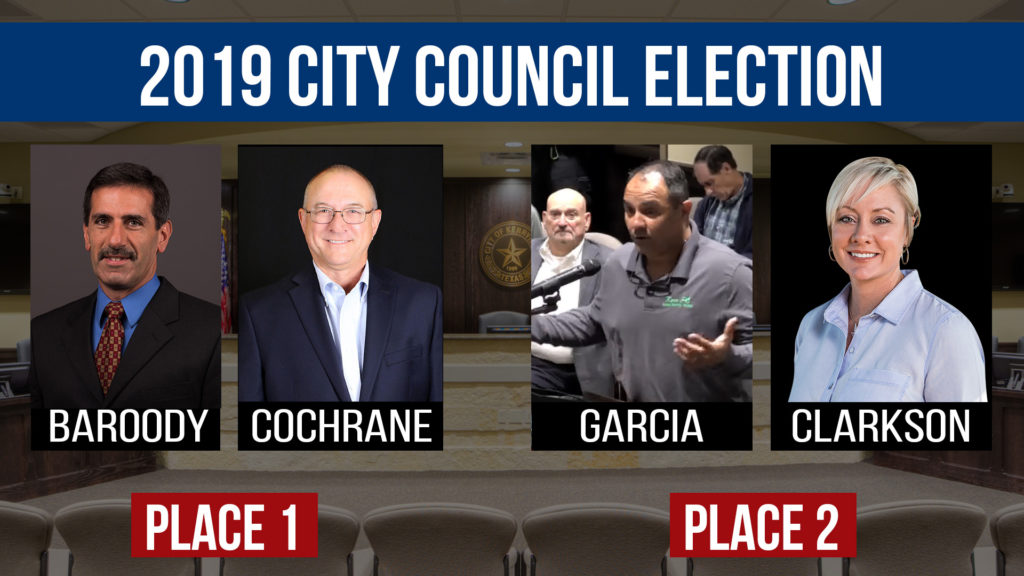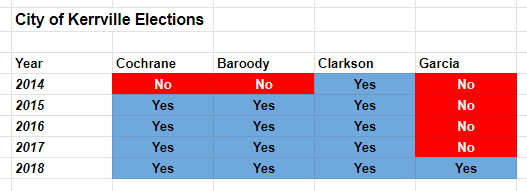As our national and state politics become more and more polarized, candidates are often confronted with this question in local elections: Which ones are Republicans and which ones are Democrats? The correct answer is… complicated.

The short answer is that our city’s charter forbids partisan labels for city council races and for city council members on the dais. Section 3.01 of the city’s charter states that all elected members “shall assume the duties of office without party or partisan mark or designation.”
Kerrville voters may recall the issue arising in the 2014 mayoral election in which Jack Pratt used campaign yard signs with the “R” designation, leading some voters to conclude that Pratt was the only Republican in the race. Councilperson Stacie Keeble moved to hold Pratt in violation of the ethics policy but no action was taken by city council. Still, the consensus of the council in that discussion was that the use of partisan designations violates the spirit of the ethics law and the charter.
In fact, only about 20% of US cities have partisan elections.
“According to the National League of Cities, the argument for non-partisan elections is that it makes party politics irrelevant and increases the odds that council and board members from opposite parties will work together.”
The Partisans Are Coming for Your Cities and Schools, Texas Monthly, May 5, 2017
As we’ve stated on this site before, almost all of the issues that council deals with are not partisan in the least. Potholes have no party. Providing clean water is not a Republican or Democratic idea. Maintaining a professional police force and fire department is not conservative or liberal ideology.
Taxation, budgeting, and spending is an area where a conservative or liberal ideology may color a candidate’s views. Kerrville has a long history of conservative financial management. The council has set backstops and limits and rainy day funds to help keep us on course and within our means. Our finance department regularly receives awards for excellent budgeting and financial management. See our video about the budget for more detail. The conclusion to draw here is that Kerrville has a long history of prudent financial management with no signal that this will change anytime in the future.
Despite the fact that most of the issues are nonpartisan, some voters insist upon understanding the ideology of each candidate on a left-versus-right spectrum, or a Republican-or-Democrat scorecard. Candidates have been known to loft charges at one another, accusing another candidate of being a Democrat or a liberal. Those charges are meant to hurt the opposing candidate since we live in a county that voted overwhelmingly Republican for at least the past two decades. By painting the opposition as an “outsider,” the candidate hurling that charge hopes to prey on those who don’t understand the nonpartisan nature of our local government.
We are not immune from the hyper-partisan rumor mill in this 2019 election cycle. Recently, a well-known political group announced Baroody and Garcia as “the conservative candidates” in the race. An invitation to a meet and greet at a private home called on guests to “join us to meet the conservative choices for City Council in the upcoming May election, George Baroody and Mario Garcia.”
We haven’t had a chance to sit down and interview the candidates yet, but there is another way to glean some insight into the candidates’ political affiliations, and that’s via their voting records in party primary elections. In fact, the candidates’ entire voting history is public and is insightful to learn not only which party they have voted for in the past, but also how often they vote, giving insight into the importance they place on government and politics and citizenship in their daily lives.
We pulled the voting records of each candidate for all elections in Kerr County going back several years. (NOTE: Election histories don’t tell us WHO the candidates voted for — only that they CAST A BALLOT in the election.)

The chart above shows the voting history of each city council candidate for Republican-only elections held over the past several cycles. As you can see, Garcia, touted as “the conservative choice,” has not voted in any Republican election over the past three years. However, his opponent, Kim Clarkson, voted in two out of three Republican Party elections since 2016.
The Place 1 candidates are also shown, and Mr. Cochrane has voted more consistently in Republican elections than his opponent George Baroody, but somehow Baroody has been advertised as the Republican in the race.
So, according to this publicly available data, Cochrane and Clarkson are actually more consistent Republican voters than are Baroody or Garcia.
Should we draw conclusions about their political ideology based only on voting history alone? Of course not. But until we have forums and interviews, this is a good reference to be aware of — especially if a voter is interested in a candidate’s commitment to a certain political party.

City Council candidates’ voting histories for the past several City of Kerrville municipal elections.
Even if we’re not looking at these histories to glean their ideology, we can look at these histories to find some insight into the candidates’ personal priorities and their civic engagement. The chart above shows the voting history for each candidate in citywide elections going back to 2014. As you can see, Cochrane and Baroody share the same voting history. However, Mr. Garcia only began voting in city elections in 2018, whereas his opponent Kim Clarkson has cast a ballot in every city race going back at least as far as 2014.
What should the average voter glean from this information? We think several takeaways are important here:
- City elections are nonpartisan for good reason; and the city’s charter insists upon governing in a nonpartisan manner
- Keeping city elections nonpartisan assures that the issues and the candidates are at the forefront of the debate — not the leaders of any political parties
- Don’t believe any rumors about party affiliation or commitment to a particular party
- Don’t believe any rumors about a candidate being conservative or liberal
- Find out about the candidates for yourself by speaking with them, attending forums, reading their campaign marketing materials, and asking questions
- Not all candidates have placed the same emphasis on civic engagement over the years
- Use this information as a starting point to gather more information; not as conclusions in themselves
NOTE: All election histories were obtained from Kerr County Elections Department over the years from 2014 to present, and are publicly available.
The last day to register to vote for the city council election is April 4. Early voting begins April 22, and Election Day is May 4.
CORRECTION: In an earlier version of this article, we incorrectly stated that a voter must be a member of a party to vote in that party’s primary. One of our savvy readers pointed out that we no longer have required party membership in Texas. Of course, you can only vote in one party’s primary per calendar year. See the Texas Secretary of State’s website for more information about party affiliations.




